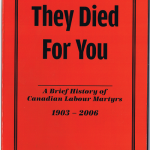 TORONTO, ON – Harm reduction workers from across the city announced today that they have formed the Toronto Harm Reduction Workers Union (THRWU), an affiliate of the Industrial Workers of the World (IWW). Workers from South Riverdale Community Health Centre and Central Toronto Community Health Centres are the first to announce their affiliations with the union, and have demanded that their managements recognize the union and commit to negotiating with them. The Toronto Harm Reduction Workers Union is the first of it’s kind in the world.
TORONTO, ON – Harm reduction workers from across the city announced today that they have formed the Toronto Harm Reduction Workers Union (THRWU), an affiliate of the Industrial Workers of the World (IWW). Workers from South Riverdale Community Health Centre and Central Toronto Community Health Centres are the first to announce their affiliations with the union, and have demanded that their managements recognize the union and commit to negotiating with them. The Toronto Harm Reduction Workers Union is the first of it’s kind in the world.
Harm reduction programs are services or policies designed to reduce harms associated with drug use (or other potentially risky behaviours) without requiring the cessation of use. The low rates of HIV transmission amongst injection drug users in Toronto today can largely be attributed to the work of activists who established the first needle exchanges in the 1980s. Since then, continuing efforts have lead to the 45 programs currently contracted by Toronto Public Health to distribute harm reduction materials and information in the city. All of these programs rely on the labour and participation of harm reduction workers, including the expertise and knowledge of many workers who use (or have used) drugs.
The city’s harm reduction programs are run by agencies with the mission to advance social and community justice, often through bettering access to employment security and other poverty-reduction measures; despite this, the workers who provide these key services are all too often denied job security themselves, and work in precarious and low-paying positions that keep them in poverty.
“As we face increasingly corporate management structures and austerity budgets, as well as the continuing toll of the war on drugs, stigma, and poverty, we realized we needed to organize ourselves as workers, to make our voice heard and push harm reduction forward”, says harm reduction worker Max Ducsharm. Ducsharm is one of 50 employed, unemployed, and student workers doing a variety of jobs – from community workers and program coordinators, to supply kit makers and outreach workers, who have so far signed up with the THRWU. He says organizing is ongoing, with plans for more workplaces to announce their affiliation with the union in the weeks and months to come.
In a rare move, the union has opted to forgo certification with the Ontario Labour Relations Board, choosing instead a ‘do-it yourself’ model of unionism. Rather than relying on government officials, lawyers or professional union staffers, THRWU members will advocate directly on their own behalf. It’s a strategy that fits broadly into a growing movement of ‘solidarity unionism’ that seeks to innovate strategies to make gains for workers in a context where traditional, Labour Board-certified unions are unable or unwilling to do so. “Labour Board certification is not an option for many workers and it didn’t make any sense for us,” said Peter Leslie.
In addition to workers, such as those without status, independent contractors and others who are legally excluded from certification, many other precarious, temporary, and casual workers face nearly impossible hurdles to Labour Board recognition. Leslie explains, “We’ve been divided by workplace for too long. We wanted an organization that could harness the power of all harm reduction workers, regardless of where they worked. We also didn’t want people’s union membership to be dependent on being employed in an industry where people are often between jobs or trying to eke out a living by holding multiple casual positions.”
“We are a union of some of the most marginalized workers in our city. We’re fighting for better jobs and better services. We’re building a movement from the bottom up.” says THRWU member Frank Crichlow.
Visit their Facebook page or website http://thrwu.org/ for more information.
Donate to their campaign.
 The Industrial Workers of the World in Canada is a union that believes solidarity and democracy in the workplace and across all industries can change our jobs and the world. Please contact your nearest branch to join and organize for a better life.
The Industrial Workers of the World in Canada is a union that believes solidarity and democracy in the workplace and across all industries can change our jobs and the world. Please contact your nearest branch to join and organize for a better life.
 TORONTO, ON – Harm reduction workers from across the city announced today that they have formed the
TORONTO, ON – Harm reduction workers from across the city announced today that they have formed the 
